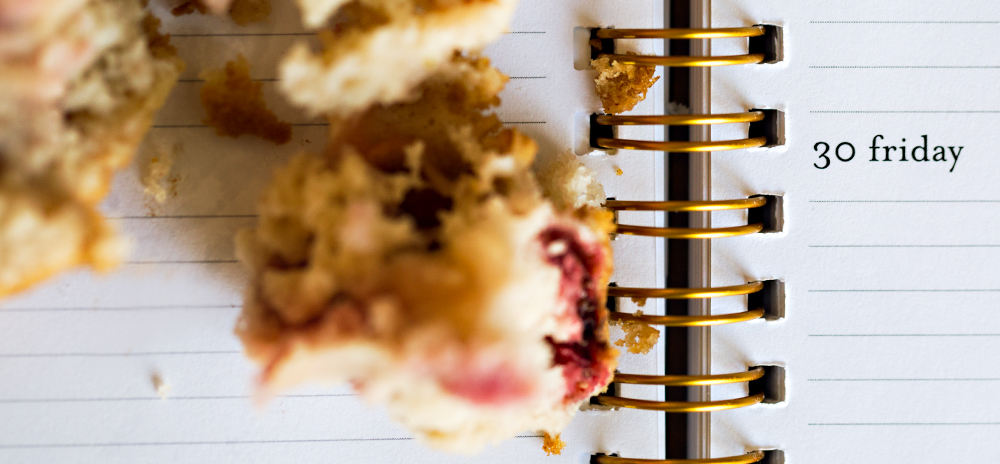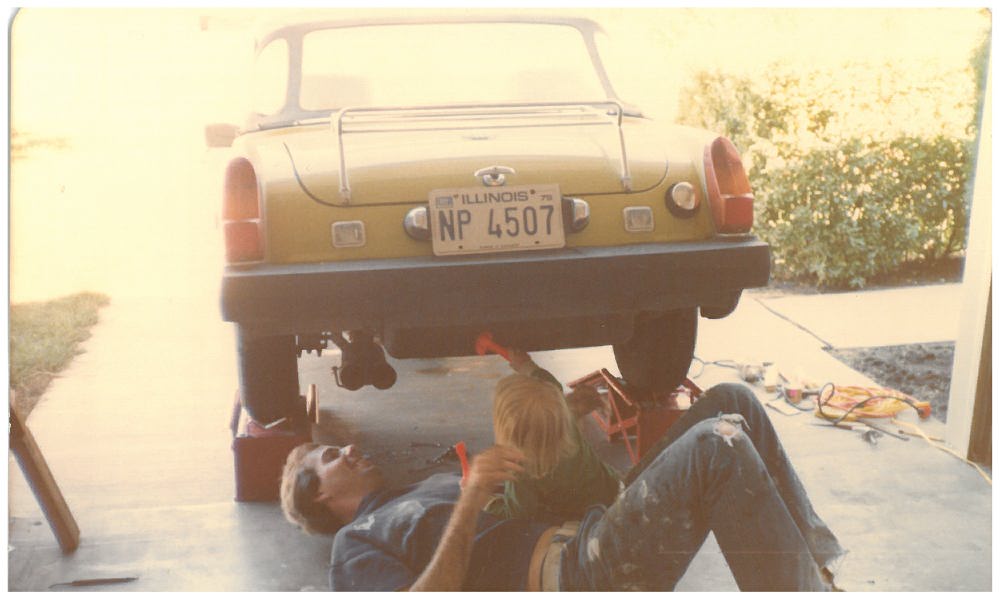Just a reminder . . . we’ll be discussing The Invention of Wings on August 29. See the post that introduces the book here. Hope you can add your voice to the conversation!
The One Prayer You Need
Have you ever hit the bottom of the prayer barrel?
You’ve been praying about the same thing day after day, month after month, year after year, yet nothing will budge.
You’ve been crying facedown before the Lord, your heart wrenching right in two, yet he seems deaf to your cries.
And now? Now you have no words left. Whenever you find yourself alone with God, the words stick in your throat. There are no eloquent petitions, no pronouncements of trust. Just the hollow beating of your heart. Even if you manage to squeeze out some words, they bounce off the ceiling, right back at you. You never wanted it to come to this, but you have no idea how to get on speaking terms with him again.
I know what it’s like to have parched lips, mute tongue. I know what it’s like to hear nothing at prayer time but the beating of my own heart. Yet the more I read Scripture, the more convinced I am that there’s only one prayer—indeed, one word—that really matters.
Abba. Daddy.
It was the first prayer the disciples learned to pray:
Our Abba in heaven . . . (Matthew 6:9)
It was the desperate cry of the prodigal son returning home to his father:
Abba, I have sinned against both heaven and you . . . (Luke 15:21)
It was the anguished cry of Jesus himself during that final week of his life on earth:
Abba, Father . . . please take this cup of suffering away from me. (Mark 14:36)
Abba, forgive them. . . . (Luke 23:34)
Abba, I entrust my spirit into your hands! (Luke 23:46)
When we cry out “Abba,” we’re not just picking one of God’s names at random; we’re claiming our special relationship to him. We’re saying we know who he is and we know who we are: his own beloved daughters and sons.
In that case, maybe it doesn’t matter so much how we pray; it’s who we’re praying to.
We don’t need to have all the right words—just the one word that makes all things right. Abba.
Into the Deep
 She said good-bye to her husband ten months ago. Well, that isn’t exactly right. She’d been saying good-bye to him for nine years . . . the slow good-bye of Alzheimer’s. He took his final breath on a blistering day last August, but he’d been slipping away from her, memory by memory, for some time before that.
She said good-bye to her husband ten months ago. Well, that isn’t exactly right. She’d been saying good-bye to him for nine years . . . the slow good-bye of Alzheimer’s. He took his final breath on a blistering day last August, but he’d been slipping away from her, memory by memory, for some time before that.
She misses him. When she walks by his picture, she wags her finger at him. “You stinker!” she says, a small smile tugging at the corners of her mouth. “Why did you leave first?”
We laugh, but we both feel the undertow of grief.
“I’m homesick for heaven,” she says. It’s barely more than a whisper.
“Do you ever ask God why?” I don’t even know which why I mean—why Bob’s memories were stolen from him, why she had to say a long good-bye to her beloved, why the Parkinson’s is now stripping her of the things she loves. But I need to know. It’s a question that burns in my own gut.
Ruth is many things to me—a mentor, the wife of my childhood pastor, a friend. But most of all, she’s a mirror of the woman I want to become someday. There’s a half-century between us, but our friendship is the richer for it. I want her wise wrinkles, her words that ooze grace, her ability to laugh at herself until tears run down her cheeks, her knack for making each guest who enters her home feel like British royalty.
And so I need to know how she does this. How does she wrestle with those prayers that go unanswered—or unanswered in the way she hoped? I’m dabbling in the shallow end of faith, and I need her to tell me how to do this when the shore is no longer in sight.
She smiles at my question—gentle, patient. “The older I get, the less I ask God why,” she says. “More and more, I’m in awe that he would entrust these wounds and difficulties to me.”
I stare at her, dumb. I’m more aware than ever that I have a single toe in the water while she’s out in the deep-blue sea. “You mean God works in spite of the wounds?”
She shakes her head ever so slightly. “The wounds are the gift.”
I’m not even Peter, sinking in the raging waves. I haven’t gotten out of the boat.
“I used to think we would bring our medals to God one day,” she says. “We’d get to heaven and show him all our successes, all the good things we’ve done. But I don’t think so anymore.”
I stare at her, wondering if she notices the waves crashing around her.
“God isn’t impressed by our achievements,” she says. “He wants our wounds. I have a feeling he’d tell us, ‘Look at my Son. He just came to me with his scars.’”
When it’s time to go, I hug her good-bye, surprised that someone so frail could squeeze so tight. As I make my way to the car, soul still reeling, I feel a question bubbling up inside me.
Why, Lord?
But this time the question is fueled by awe.
Of all the people in the world, why do I get to be her friend?
I don’t know why. But like Ruth, I’m starting to realize that maybe that’s not the most important question. Maybe it’s time to leave the shore behind and follow her into the deep.
You call me out upon the waters
The great unknown where feet may fail
And there I find You in the mystery
In oceans deep My faith will stand.
—From “Oceans” by Hillsong United
Friday Favorites for July
And now . . . for a few of my favorite things for July. Enjoy!
For anyone who has ever tried to articulate whether they like a book . . .
These book reviews by kids are part insightful and part hilarious. Case in point: “This was a good book but it didn’t make much sense.” Book Reviews by Kids
For bookmark aficionados . . .
I realize a scrap of paper or a receipt would work just as well, but I do love a good bookmark. These are fabulous—especially the bedside lamp bookmark. Creative Bookmarks
For anyone who has wondered if their marital status makes them less valuable . . .
Shauna Niequist nails it again: “Marriage doesn’t make you me more special. It’s not a status symbol.” You Are Significant with or without a Significant Other
For anyone who likes to devour books . . .
These cakes are literary and culinary masterpieces. Just wait till you see the Narnia-themed one! Gorgeous and Delicious Literary Cakes
Announcing the Book Club for July
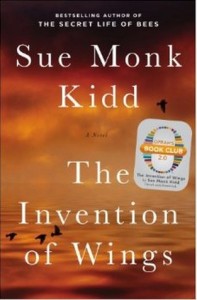 Thanks to everyone who participated in our discussion about This Is the Story of a Happy Marriage, which we discussed here. Congratulations to Megan for winning a free book!
Thanks to everyone who participated in our discussion about This Is the Story of a Happy Marriage, which we discussed here. Congratulations to Megan for winning a free book!
And now . . . announcing the next book club! We’ll be reading The Invention of Wings by Sue Monk Kidd.
Here’s the description from the author’s site:
From the celebrated author of The Secret Life of Bees: a masterpiece of hope, daring, the quest for freedom, and the desire to have a voice in the world.
Hetty “Handful” Grimke, an urban slave in early nineteenth century Charleston, yearns for life beyond the suffocating walls that enclose her within the wealthy Grimke household. The Grimkes’ daughter, Sarah, has known from an early age she is mean to do something large in the world, but she is hemmed in by the limits imposed on women.
Sue Monk Kidd’s sweeping new novel is set in motion on Sarah’s eleventh birthday in 1803, when she is given ownership of ten-year-old Handful, who is to be her waiting maid. We follow their remarkable journeys over the next thirty-five years, as both strive for a life of their own, dramatically shaping each other’s destinies and forming a complex relationship marked by guilt, defiance, estrangement, and the uneasy ways of love.
As the stories build to a riveting climax, Handful will endure loss and sorrow, finding courage and a sense of self in the process. Sarah will experience crushed hopes, betrayal, unrequited love, and ostracism before leaving Charleston to find her place alongside her fearless younger sister, Angelina, as one of the early pioneers in the abolition and women’s rights movements.
Inspired in part by the historical figure of Sarah Grimke, Kidd goes beyond the record to flesh out the rich interior lives of all her characters, both real and invented, including Handful’s cunning mother, Charlotte, who courts danger in search of something better, and Charlotte’s lover, Denmark Vesey, a charismatic free black man who is planning insurrection.
This exquisitely written novel is a triumph of storytelling that looks with unswerving eyes at one of the most devastating wounds in American history, through women whose struggles for liberation, empowerment, and expression will leave no reader unmoved.
We will discuss this book at the end of August.
{Remember, there will be a free book giveaway for one lucky commenter!}
Book Discussion: This Is the Story of a Happy Marriage
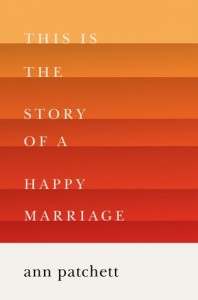 Thanks to everyone who read our book for this month. We’ll be discussing This Is the Story of a Happy Marriage by Ann Patchett, which I introduced here.
Thanks to everyone who read our book for this month. We’ll be discussing This Is the Story of a Happy Marriage by Ann Patchett, which I introduced here.
Here’s how it works: I’ll throw out a few topics for discussion, and you can write your responses about these topics (or others you’d like to discuss) in the comment section.
Discussion #1: A Glimpse into the Writing Process
Of all the descriptions I’ve read about the writing process, Patchett’s words are among the most profound and relatable. She captures both the magic and the torture of the process, and I continually found myself saying, “What? You too?” I think a lot of writers have this suspicion that writing comes easily for everyone else, so it’s a huge relief to know that not even Ann Patchett has fairy dust sprinkled over her computer. My favorite part is where she describes an idea for a novel as a beautiful butterfly that she allows to fly free in her imagination for a while, until finally she has no choice but to pin it down with words:
I reach up and pluck the butterfly from the air. I take it from the region of my head and I press it down against my desk, and there, with my own hand, I kill it. It’s not that I want to kill it, but it’s the only way I can get something that is so three-dimensional onto the flat page. . . . Imagine running over a butterfly with an SUV. What I’m left with is a dry husk of my friend, a broken body chipped, dismantled, and poorly reassembled. Dead. That’s my book. . . . The journey from the head to the hand is perilous and lined with bodies.
Have you done any writing? If so, was there anything in Ann Patchett’s descriptions about the writing process that resonated with you?
Discussion #2: What Dreams Are Made Of
I appreciated the way the author describes what it takes to achieve the dream of being a writer—or of achieving any dream, for that matter. Dreams need a spark of wonder to get started, but ultimately they require steady determination if they’re going to go anywhere.
Why is it we understand that playing the cello will require work but we relegate writing to the magic of inspiration? . . . If you want to write, practice writing. Practice it for hours a day, not to come up with a story you can publish, but because you long to learn how to write well, because there is something that you alone can say.
Have you found this to be true when pursuing your own dreams? Which comes more easily for you: the inspiration or the hard work?
Discussion #3: Jumping in with Both Feet
People often have the idea that writers hole themselves up in dark rooms and emerge only on rare occasions for interviews or bathroom breaks. With her remarkable gumption, Ann Patchett defies such stereotypes. She’s willing to live out her research—almost to the extent of making her own life an experiment. Cases in point: she joined the LAPD, became a regular at the opera, and took a cross-country trip in an RV—all for the sake of a story. And just when brick-and-mortar bookstores were all shutting their doors, she decided to do her part to buck the trend and opened her own independent store (you can check it out here).
Would you enjoy having a job that allows you to experience alternate lives firsthand? Did this book make you want to visit Ann Patchett’s bookstore?
Discussion #4: Our Friend Ann
I went into this book unsure whether I’d like it or not. I adored Patchett’s Bel Canto, but I wasn’t as taken with her other titles. And not every author is able to pull off writing bothfiction and nonfiction, so I didn’t know what to expect from a collection of essays. But the tone in these pieces won me over immediately. The author comes across as warm, witty, accessible, smart, and above all, very human—like we’d certainly be friends if only we had a chance to meet. I also gained a new insight about her books when I read this. I’d always thought her novels were vastly different from one another (one about a magician, one about an opera singer, and one about a pharmacist in the Amazon jungle), but she explains that all of her books are based on the same premise: people getting thrown together in strange environment. And I have to say, reading this book made me want to read more Ann Patchett.
Did you enjoy the tone of this book? Were you inspired to read more titles by the author?
Rating
I would recommend this book to anyone who writes or anyone who wants to know what goes on inside a writer’s head. It’s like a pleasant chat with an author-friend. (I’d also mention that the title is pretty misleading—there’s one essay about marriage, but that’s not the focus of the book.) I’d give this title five stars (out of five).
How many stars would you give this book?
Remember: There will be a free book giveaway for one lucky commenter!
Getting a New Name
Shauna Niequist wrote a beautiful post a while back about the old stories we believe about ourselves. Even though God has been at work in us, transforming us and giving us new identities, we continue to buy into old versions of ourselves—or lies we’ve bought into for too long.
In her post “Change the Story” she says:
There are people and situations that take us back to old, old stories, and even though we’re moms now, not children, or even though we’re business owners now, not adolescents, we find ourselves acting out stories that haven’t been true for a long time, or stories that were never true to begin with.
I’ve been thinking about this lately, and I’ve been reminded of those famous words of Jesus: that the truth will set you free.
One of my friends sees herself as nonconfrontational, fearful of stepping into dangerous situations. But as I’ve watched her parent a son with severe allergies, I see how God is rewriting that story. I first witnessed this growing bravery when she discovered her son’s dairy allergy. She was miles from home and husband, but she confronted every obstacle in her way to find out what was happening to her baby and get him the help he needed. And as I watch her continue to advocate for her little guy at restaurants, at school, and on playdates, making sure he’s safe physically and not being left out, she is growing into many shades of brave.
Another friend holds on to an old version of herself—a story that she is slow to warm up with new people, that no would pursue her or connect with her without a long lead time. But over the years, I’ve seen her stepping out in her job, flourishing in her interactions with clients, stepping into new friendships, making herself rightly vulnerable in relationships new and old. And something amazing is happening: people are seeing her for the beautiful woman she is. God is rewriting her story.
For years I’ve believed that I was destined to live in fear. I worried about big things and little things, about the noise in my attic that was most likely a serial killer and about global warming and about losing the people I loved most. I decided that my condition was chronic—that I’d just have to figure out how to live with it. But somewhere along the way, God began to rewrite that script. Instead of keeping a running tally of my worries, I started to track all the ways I’d seen his faithfulness to me. And ever so subtly, I noticed that fear was no longer in the driver’s seat of my life.
One of the things I appreciate about God is that he loves us just the way we are but doesn’t leave us that way. The evidence is there all through Scripture as he discards old stories and gives people new names, new identities:
- When God gave Abram a promise for generations to come, he told him, You are no longer Abram. From now on, you will be Abraham—the father of many nations (Genesis 17:5).
- When Jacob had an encounter with God, God told him, You will no longer be called the deceiver. From now on, your name will be Israel—one who has struggled with God (Genesis 32:28).
- When Jesus met Peter, he said, Your name is no longer Simon. From now on, you will be Peter, the rock (Matthew 16:18).
I hear God saying the same thing today:
- You are no longer Timid. My daughter, your new name is Brave.
- You are no longer Unseen. You are my daughter Beloved.
- You are no longer Much-Afraid. You are my daughter Learning-to-Trust.
What about you? Is there a story that God has rewritten in your life—or one that he’s rewriting now? Has God given you a new name? I’d love to hear about it, I’d be honored to pray for you on this journey.
What Prayer Tastes Like
Have you ever wondered what prayer tastes like?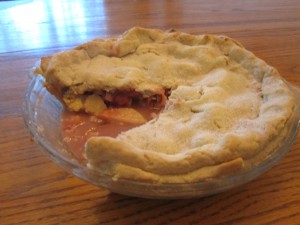
Up until yesterday it wouldn’t have occurred to me that prayer intersects with the taste buds at all. But now I can say with pretty firm confidence: prayer tastes like strawberry-apple pie.
I asked a friend to pray for me yesterday. There was something specific on my calendar, and I knew it was bigger than me, so I asked her to go with me through her prayers. And over the course of that hour, I felt covered somehow. Braver than usual, more myself than usual. And I knew I wasn’t alone.
Later that evening the doorbell rang, and it was my friend and her family. In her arms she was carrying something warm and wrapped in a dish towel. When she put her bundle on the kitchen counter and pulled back the cover, a heavenly aroma wafted into the room. It was a homemade pie. Sweet strawberries mingled with cinnamony apples. And it was still warm from the oven.
“I wanted to do something with my hands while I was praying for you,” she said.
I’ve had people tell me they were praying for me before, but it’s not every day that you can see the results of someone’s prayers—let alone taste them.
When I took the first mouth-watering bite, I thought, So this is what prayer tastes like. Sweet and tangy and baked to perfection inside a golden crust.
I pictured my friend rolling out the dough, asking God to smooth out the path before me. I imagined her slicing strawberries and peeling apples as she prayed for God to cut away the obstacles. I envisioned her scooping the flour and sugar, all the while requesting extra measures of wisdom and guidance.
As I licked the last few crumbs from my plate, I thought about what a brilliant idea a prayer pie is. If the thing you’re praying about utterly flops, your sorrows go down much easier à la mode. If things go well, what better way to celebrate than to toast with a forkful of pie? And either way, you will know that the hands that made it were the same hands that prayed you through.
So I guess that’s what prayer tastes like. A little like homemade pie. And a lot like love.
Dear Dad: A Non-Apology Letter
I heard the sickening scraping sound before I saw it. A piece of wood trim that had been firmly attached to the garage just moments before. I was only 16, my license shiny and new in my wallet. Still, I knew better, Dad. And I should be sorry for peeling out of the garage and ripping off a chunk of the wall. But I’m not.
Do you remember that day as clearly as I do? Mom was out of town, and you let me drive her car while she was gone. It was a big deal—the first time I got to drive myself to school instead of taking the bus. I was well aware that this was a privilege, and one that could be easily revoked. But I heard the school bus coming, and I knew that if I didn’t hurry, I’d be stuck behind the bus all the way there.
So with single-minded focus, I backed the car out of the driveway, eyes on the rearview mirror, scanning for the bus. That’s when I heard it. First the scraping, then the thunk. The wooden trim around the door was no match for the side of the car. But there was no time to assess the damage. I kept driving.
I should be sorry about the car, about the garage door you had to fix, about my lack of responsibility. But I’m not. Because that evening, when I told you what I’d done (which you’d already pieced together), you played for me notes of grace that have echoed in my ears ever since. You didn’t let me off the hook—as I recall, we spent the evening together with a hammer, a few nails, and a bucket of paint. And later that night, I had a confessional phone call to make to Mom.
But in that moment you showed me what forgiveness looks like: you loved me just the same in spite of what I’d done, and then you went to work doing the cleanup right alongside me.
I wasn’t sorry several months later, either, when I won the safe driver contest at that ceremony at the fancy hotel. Remember how I looked over at you, wide eyed, when they announced my name? I knew there was no way I deserved it. But you just winked at me, nudging me to go up and accept the award.
Can you believe it’s been almost exactly twenty years since the infamous garage door incident? If I’d backed out the way you taught me, I wouldn’t remember that moment all these years later. So no, I’m not sorry, because right then I knew that whenever I crashed again at some point in the future—whether behind the wheel of a car or otherwise—I could come to you with the broken pieces.
Some days when I’m back home visiting you and Mom, I walk past the same garage door, with the repainted trim, and I marvel that it’s intact again. To anyone else, it probably looks as if nothing ever happened. But I’ll never forget the ugly squeals and scrapes I heard that day, followed by the echoes of pounding grace.
An Editor’s Unexpected Job Hazards
 I suspect every job comes with its share of hidden job hazards that they don’t tell you about in your interview—perils that likely aren’t covered by worker’s comp, either. Here are a few of the hazards I face every day as a result of my career choice.
I suspect every job comes with its share of hidden job hazards that they don’t tell you about in your interview—perils that likely aren’t covered by worker’s comp, either. Here are a few of the hazards I face every day as a result of my career choice.
1. It’s almost impossible for me to read without a pen in my hand.
I can’t help but recall that ill-fated time I was reading Middlemarch for a book club I was in. I was about a third of the way into the book, having been happily underlining and scribbling marginalia for several hundred pages, before I remembered it was a library book. I had no choice but to plead my case to the stoic librarian: “What can I say? An editor always reads with a pen!”
2. My hands are crisscrossed with paper cuts.
After flipping through sets of galley pages, my hands always seem to end up in a jumbled, haphazard mess. And I have to say, it’s not as easy as one might expect to straighten several hundred 11 x 17 pages into a neat stack. Inevitably, just as I’ve gotten the pages almost presentable enough to pass on to the next person, the paper slices through that tender spot on the palm of my hand. (But I have to say, it’s well worth it to see those words coming together in a form that closely resembles a book.)
3. I’ve come down with an incurable case of pen snobbery.
I used to be able to write with a pen like a normal person—meaning that the primary prerequisite for a pen is that it contains ink and gets your message onto paper. Not so anymore. Now if it’s not a Pilot Precise V5 Rolling Ball Extra Fine, I find myself in a vague state of panic.
4. My nightstand is perpetually on the verge of collapse.
Being around authors, editors, story lovers, and word people all day means my list of books to read is inexhaustible. At any given time, I’m probably in the middle of approximately five books—a book for each of my book clubs, one for spiritual edification, a nonfiction title in hopes that I’ll become marginally smarter, and a fiction book that’s purely for fun. I have a book to read in the morning and one to fall asleep with at night, a book to listen to while I’m working out and one to listen to during my commute. They say the first step to recovery is admitting you have a problem. . . .
5. My days are marked by book-induced feelings.
When I was editing a book filled with stories about Southern Cooking, I found myself perpetually ravenous for fried chicken, and I’m pretty sure I snacked my way through all two hundred pages. When I worked on a book about a man who climbed Mount Everest , I felt cold all day and had to layer up my outfits for a month. When I was editing a football player’s manuscript, I suddenly had a vested (and unprecedented) interest in which teams would make it to the Super Bowl. When I worked on a book by a Texan, I shamelessly started saying y’all (you have to admit it’s more charming than the Midwestern “you guys”).
So take warning, all of you aspiring editors out there. These job hazards could haunt you too, should you commit yourself to a life of books. (But trust me, it will be worth every paper cut.)
So what are the unexpected hazards of your job?
- « Previous Page
- 1
- …
- 20
- 21
- 22
- 23
- 24
- …
- 45
- Next Page »

